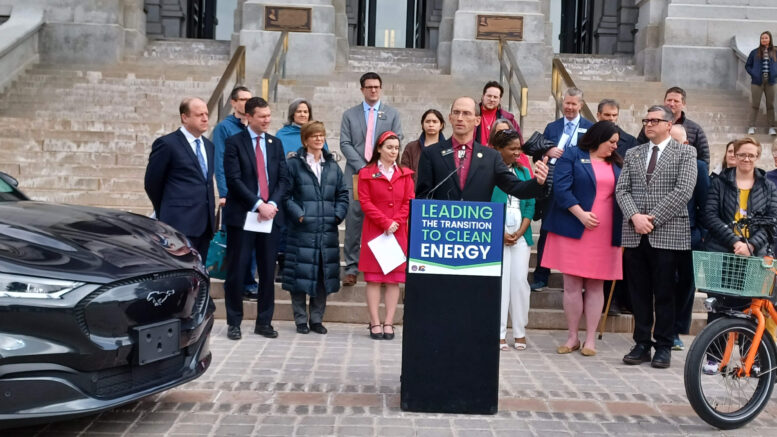The centerpiece bill of Gov. Jared Polis’ green-energy incentives package includes both carrots and sticks for businesses, offering new tax credits to industrial facilities reducing greenhouse gas emissions but also cutting the severance tax ad valorem credit given to oil and gas producers.
House Bill 1272, sponsored by Democratic Reps. Mike Weissman of Aurora and Junie Joseph of Boulder, also offers consumer-focused tax breaks for purchasing electric vehicles and e-bikes, creates tax benefits for installing heat pumps and launches tax credits for opening and operation geothermal energy facilities. It’s part of a broader package of bills that Polis and Democratic legislators unveiled in early March that touch also on the streamlining of solar installations, the creation of incentives for green-hydrogen production and the introduction of a regulatory environment for carbon-capture projects.
HB 1272, which passed out of its first committee on Thursday on a Democrat-led, party-line vote, is a cog of the bill portfolio because of its financial investment, proposing to give nearly $100 million in tax breaks in the fiscal year that begins in July 2024 to achieve decarbonization. Of those, the industrial clean energy tax credit, at $20 million, is the second-largest offering, behind only the expanded tax credits for electric vehicles.
Industrial tax break
The bill creates a refundable state income tax credit equal to 30% of the cost of industrial facilities’ cost of undertaking an industrial-emissions study up to $1 million, and as much as 50% of a factory’s cost of making improvements to reduce its greenhouse gas emissions. Sponsors have set the credit up to run from July of this year through June 2032, with larger breaks available to companies that install technology not yet available on the commercial market.
Colorado Energy Office Executive Director Will Toor said that in addition to the reduced air pollution the tax credits can bring about, he wants to offer them now to let company owners take advantage of them simultaneously with new federal tax credits for the same purpose.
“We have great need to do more quickly to reach our climate goals,” Weissman said at the start of the bill’s hearing before the House Energy and Environment Committee. “And we continue to be in a period of economic need where recovery has been disparate, and I think this is a way to try to help everyone.”
Severance tax change
However, oil-and-gas industry groups questioned why they are being asked to be the one industry that would see their tax burdens rise in a bill that is focused on lowering costs for virtually everyone else.
Extraction companies now are allowed to claim tax credits on their state liability that are equal to 87.5% of the property taxes they pay to local governments on the amount of oil and gas they produce. That’s one of three taxes that the companies pay on the same barrel of oil, adding to a conservation mill levy that they pay to the state, as well as standard state sales tax, explained Travis Holland, a longtime industry accountant testifying for the Colorado Oil & Gas Association and the American Petroleum Institute Colorado.
HB 1272 would reduce the tax credit to 75% in the fiscal year that begins in July and cut it further to 65.625% in July 2025. The credit would revert to 87.5% at the end of 2032, which is the sunset on the last of the tax credits proposed in the bill.
Weissman described the tax-credit reduction as “not … that significant of a change,” pointing to studies showing that Colorado’s 1.5% effective severance-tax rate is at the second-lowest level of all the oil-producing states in the West. He said the added revenue, estimated at $28.3 million in the first full fiscal year the cut would be in law, is needed to help fund the green-energy investments, and he added that some of the technology used in oil and gas production would be applicable to geothermal-energy production, allowing some firms losing a tax break to gain another one also.
Questions of industry targeting
Rep. Gabe Evans, R-Fort Lupton, noted, however, that a committee is currently studying long-term policies around the state’s severance tax, and he said that he felt the bill was acting too early in reducing the tax credit before the committee has made any recommendations. Rep. Ken DeGraaf, R-Colorado Springs, went further and apologized to the oil and gas industry for becoming “the whipping boys to our economy.”
“We are a bit perplexed as to why this body would look to increase taxes on the natural gas and oil industry during a time of both record-high energy prices and a projected state budget surplus forecasted for the next several years,” added Kait Schwartz, API Colorado director.
Several members of 350 Colorado, a grassroots climate-protection and environmental-justice organization asked committee members to cut the ad valorem tax credit even further or eliminate it altogether, saying that the state shouldn’t subsidize companies that frack and drill. Heidi Leathwood, a policy analyst for the group, also asked unsuccessfully that the committee eliminate the proposed industrial clean energy tax credits, saying that they could be given to potential recipients like Suncor Energy before the company with a Commerce City petroleum refinery “cleans up their act.”
HB 1272 heads next to the House Finance Committee.
